US Considering Sending Seized Iranian Arms To Ukraine - WSJ
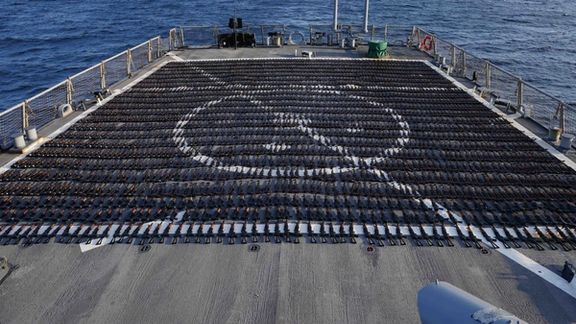
The US military is considering sending Ukraine thousands of seized rifles and ammunition once bound for Iran-backed Yemeni rebels, the Wall Street Journal reported Tuesday.

The US military is considering sending Ukraine thousands of seized rifles and ammunition once bound for Iran-backed Yemeni rebels, the Wall Street Journal reported Tuesday.
US officials said they are looking at sending Ukraine more than 5,000 assault rifles, 1.6 million rounds of small arms ammunition, a small number of antitank missiles, and more than 7,000 proximity fuses seized in recent months off the Yemen coast from smugglers suspected of working for Iran, according to the report.
“The unusual move would open up a new supply of firepower America and its allies could tap into as they struggle to meet Ukraine’s need for military support as its war with Russia enters its second year,” the WSJ wrote.
“The war in Ukraine is consuming an enormous amount of munitions and depleting allied stockpiles,” NATO Secretary-General Jens Stoltenberg said Monday, on the eve of an alliance meeting. “The current rate of Ukraine’s ammunition expenditure is many times higher than our current rate of production. This puts our defense industries under strain.”
The US had announced two arms seizures this year from vessels traveling in the Sea of Oman, on a route often used to carry arms from Iran to Yemen. There were also arms seizures last year. The two consignments captured this year yielded more than 5,000 AK-47 assault rifles.
Iran has been supplying kamikaze and possibly larger drones to Russia since mid- 2022 that have been used against infrastructure targets in Ukraine. The West has warned Iran to seize arms supplies to Russia, expressing serious concern.

Renowned filmmaker Mohammad Rasoulof who was told not to return to prison from his medical furlough says the end of imprisonment is not the beginning of freedom.
Rasoulof who has been in and out of prison several times in the past few years for his works, was told not to return to prison, apparently as part of a partial amnesty announced earlier this month.
Rasoulof, winner of many prestigious film awards, said in an Instagram post Monday announced his release. “The end of imprisonment is not the beginning of freedom,” he wrote while wishing freedom for many other prisoners of conscience still remaining behind bars.
Several hundred prisoners including protesters, political prisoners and prisoners of conscience, and journalists have been freed since the announcement of Khamenei’s amnesty that authorities said would apply to “tens of thousands of prisoners”. Some of these had nearly served their whole sentence.
Judiciary authorities said that the amnesty would apply to those who “repented” from their supposed crimes and pledged not to repeat the offences.
Some of the those released from prison since then, including Zahra Kashkaki, a student at Tarbiyat Modarres University in Tehran who was arrested for protesting, say they had to sign a pledge. “I signed it. I hate myself,” she tweeted.
Apparently, many others have neither sought to benefit from the amnesty nor signed anything but were freed. Some including activist and Kurdish language teacher Zara Mohammadi even say they were hastily “kicked out” without them, their families, or their lawyers having asked for their freedom.
Human rights organizations, activists and lawyers have criticized Khamenei’s partial amnesty for protesters as a mere attempt at rescuing the image of the regime rather than a real step towards recognition of social and political freedoms and an end to repression.
“The mass amnesty of the prisoners of the Woman, Life, Freedom revolutionary movement on the condition of repenting indicates the continuance of Khamenei’s domineering mentality. It’s an endeavor condemned to defeat for mending his broken authority and fallen image,” US-based activist Ali Afshari tweeted while opining that it could also be a
security measure to prevent possible unrest in prisons where political prisoners are held.
“Amnesty? Detained protesters have done nothing wrong to be pardoned by Khamenei. It is Khamenei and the regime suppressers who must seek the forgiveness of political prisoners, those harmed and the families of those killed in the Woman, Life, Freedom movement protests,” journalist Morteza Kazemian tweeted after the announcement of Khamenei’s amnesty.
Rasoulof who is a Berlin Golden Bear winner, and his colleague Mostafa Al-e Ahmad were arrested in July 2022 after signing an appeal along with tens of other filmmakers and film industry workers. The appeal called on security forces to “lay down” their weapons and urging them to stop suppression of protests in Khuzestan Province fueled by the collapse of a newly built multi-story building in Abadan that killed over forty people.
After the execution of Mohsen Shekari, one of the four protesters the regime has hanged in the past five months, Rasoulof and other political prisoners issued a statement in which they said the execution was proof of the regime’s “desperation” and would only serve greater solidarity among the protesters.
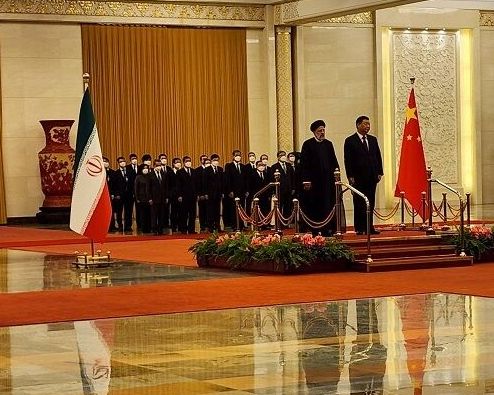
China's President Xi Jinping will hold talks with Iranian President Ebrahim Raisi during his three-day visit to China, as he received him in Beijing on Tuesday.
Xi had invited Raisi to Beijing, and their meeting comes as both Iran and China face rising tensions with the United States over a range of global issues.
Ahead of his visit, Raisi wrote an editorial in China's state-controlled People's Daily in which he said both countries believe that unilateralism and "violent" measures such as the imposition of "unjust" sanctions are the main causes of crises and insecurity in the world.
In the editorial, Raisi described China as an "old friend", and said Iran's efforts to strengthen bilateral relations would be unaffected by regional and international situations.
The two governments are expected to sign cooperation documents during the visit, according to Iran's state news agency IRNA. A 25-year strategic partnership deal signed in 2021 has remained largely on paper.
Xi visited Saudi Arabia in December and also met members of the Gulf Cooperation Council, followed by a joint statement in which the issue of three Iranian islands in the Persian Gulf was mentioned as a claim pursued by the United Arab Emirates.
The Iranian public showed a strong reaction once the joint statement was reported by Persian media, accusing their own government of being so weak that its ally China was subtly endorsing the UAE claim.
Xi and Raisi pledged to forge a stronger alliance when they last met in person on the sidelines of the Shanghai Cooperation Organization summit in the Uzbek city of Samarkand in September.
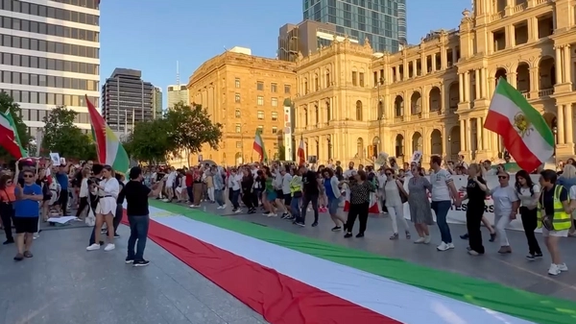
Australia’s home affairs minister announced Tuesday that security agencies disrupted a plot by the Iranian regime against citizens of Iranian descent on its soil.
The individual targeted was an opponent of the Iranian regime who took part in recent protests in Australia. Iranian communities worldwide have held frequent rallies to support their countrymen in their uprising against the government.
The individuals involved in the plot allegedly monitored the home of the anti-regime activist and extensively researched the person and the family, the Guardian reported.
Home affairs minister Claire O’Neil revealed the incident in a speech to the Australian National University, while condemning foreign interference as “one of the core threats our democracy faces.”
The incident took place last year as protests were raging in Iran and security forces were using lethal force against protesters, killing more than 500 and inflicting gunshot wounds on hundreds of others. As young people were dying and many were losing their eyes to shotgun fire, Iranians in many countries began organizing and holding protests to support their compatriots.
Australia’s announcement came one day after British anti-terrorism police announced the arrest and indictment of an Austrian citizen for stalking the headquarters of Iran International television network in London. The network and its journalists have been under threat at least since last November and under police watch.
Earlier this month the Australian Senate expressed concerns about credible allegations of intimidation and threats against Australians, residents and their families, urging the responsible ministers to provide an update to the Parliament and the Australian public on the government’s current assessment of whether persons connected to the regime are undertaking such behavior in Australia.
O’Neil praised the Australian Security Intelligence Organization (Asio). “I’m pleased to say our agencies were on to it like a shot. Asio tracked the operation and shut it down immediately,” she said.
She defended the right of Australian citizens to criticize a foreign regime and added that security agencies were “not going to stand back and have Australians or indeed visitors to our country watched and tracked by foreign governments on our soil.”
The Islamic Republic has long threatened, killed and kidnapped dissidents in democratic, and neighboring countries where they found refuge. The history of these attacks goes back to the 1980s and as recently as last year and as far the United States, where rights activist leader Masih Alinejad in New York was the alleged target of two separate terrorist plots.
The danger to Iranian dissidents abroad is real but O’Neil said, “This is Australia, this is our democracy, and if you engage in activities like this, you will be discovered.”
“To those states who operate in the shadows, I have a simple message – we are watching you. Where our national interest is served by calling out your operations, we will. And to those in Australia making their voice heard, we are acting to protect you.”
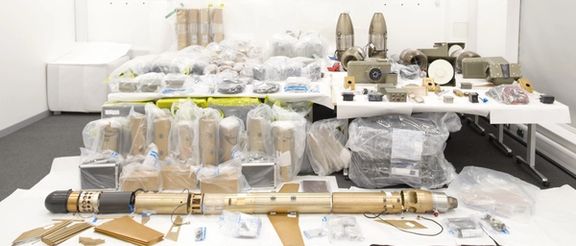
The United Kingdom has submitted evidence to the UN showing that the Iran’s Revolutionary Guard (IRGC) is violating Security Council resolutions.
According to a statement by the UK Ministry of Defense on Monday, weapons seized by Royal Navy ship HMS Montrose, which have been presented to the UN as evidence, proved the IRGC is smuggling weapons in violation of a UN Security Council resolution, indicating that the UK is turning the screws on the Islamic Republic.
“On two occasions in early 2022, HMS Montrose seized Iranian weapons from speedboats operated by smugglers in international waters south of Iran,” the statement said, adding that “the items included surface-to-air-missiles and engines for land attack cruise missiles, in contravention of UN Security Council Resolutions 2231 and 2140,” approved in 2015.
The defense ministry also said that “The weapons were presented to representatives of the United Nations who provide an assessment of the conflict in Yemen and Iranian nuclear activity.” “The interdictions were referred to in the Secretary General’s UNSCR 2231 report published in December 2022 and are expected to feature in the UNSCR 2140 annual report that will shortly be released.”
In reference to the evidence, Defense Secretary Ben Wallace said that London is committed to upholding international law and will continue to counter Iranian activity that contravenes UNSC resolutions and “threatens peace across the world.” That is why the UK has a permanent Royal Navy deployment in the Persian Gulf region, conducting vital maritime security operations and working in support of peace in Yemen, he added. The Royal Navy has a permanent deployment of a Type 23 Frigate, equipped with a Royal Marine boarding party and a Wildcat helicopter to support maritime security operations in the Gulf of Oman.

A key piece of evidence presented by the UK was a commercial quadcopter drone designed for reconnaissance activities. According to the statement, “By decrypting the internal memory of the uncrewed aerial vehicle (UAV) controllers, the UK Ministry of Defense discovered the records of 22 test flights conducted at the IRGC Aerospace Force Headquarters and test facility in western Tehran." The Islamic Republic failed to delete flight logs from a drone on its way to Yemen.
Minister of State for the Middle East, Lord (Tariq) Ahmad of Wimbledon said, “Once again, the Iranian regime has been exposed for its reckless proliferation of weapons and destabilizing activity in the region.”
Iran’s sustained military support to the Houthis and continued violation of the arms embargo has stoked further conflict and undermined UN-led peace efforts, the official added, noting that “The UK will continue to act to protect the security of our partners and hold Iran to account.”
“The UAV was in the same shipment as a number of Surface to Air Missiles and components for the Iranian Project 351 land attack cruise missile. This evidence indicated a direct link between the Iranian state and the smuggling of missile systems being used by the Houthis to attack the Kingdom of Saudi Arabia and the United Arab Emirates,” read the statement.
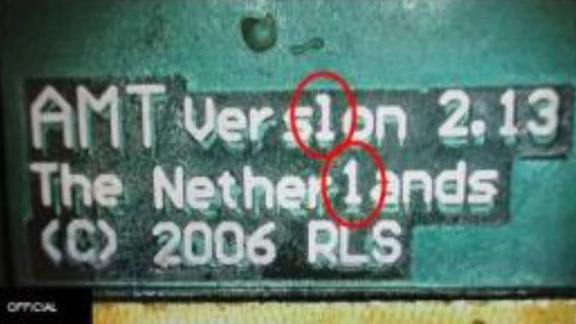
The Iranian regime has been arming, training and supporting Houthi forces since at least 2015. Previous weapons and missiles used by the Yemeni rebel force were examined by UN experts before and found to have Iranian origin.
The UK defense ministry added that “The threat posed by long range weapons made in Iran is not limited to the Middle East. Since the invasion of Ukraine, Iran has supplied hundreds of Shahed one way attack drones to Russia; these transfers violate UNSCR 2231. These attacks have killed civilians and damaged critical national infrastructure (such as power substations) far from the front lines of the conflict.
The British government also revealed that a typo in the word "Netherlands" helped expose illegal Iranian weapons shipments to Yemen. The word was spelt "Nether1ands" on part of a missile engine, in what defense officials believe was a clumsy attempt by Iran to pretend the component was Dutch. The word "version" was also misspelt as "verslon" in one of the missile parts seized by Britain's Royal Navy last year.
Such evidence can be used in case of snapback at the UN Security Council. In December, the United States, France, and the United Kingdom met to argue that Russia and Iran are violating UN Security Council Resolution 2231 by Tehran sending military drones to Moscow
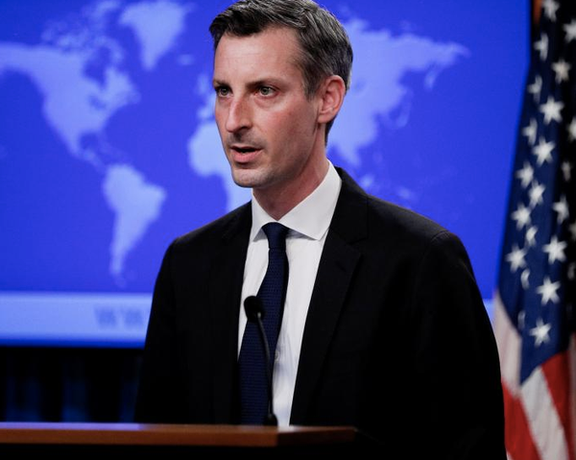
The United States is doing everything possible to counter the “burgeoning” military ties between Iran and Russia, the State Department spokesperson said Monday.
In response to a question by Iran International’s correspondent Samira Gharaei about a report on Monday that Iran has supplied new drones to Russia, Ned Price said that the US has been warning about this expanding “two way” relationship since last year.
Price reiterated that “we are taking action to do everything we can to counter this relationship and to counter the transfer of technology…we have exposed this linkage and we are continuing to galvanize countries around the world to maintain focus on this.”
He went to characterize the alliance between Moscow and Tehran as a “profound threat to the people of Ukraine but also a security relationship that has the potential to be a threat way beyond.”
Asked about Iranian opposition leaders coming together and potentially forming a council to counter the Islamic Republic, Price said the United States cannot make decisions for Iranians but it is eager to listen to both those inside the country and activists in the diaspora, and will continue to hear a wide spectrum of voices.
Price also confirmed that US Special Envoy for Iran Robert Malley was heading a delegation that has arrived in Saudi Arabia to hold discussions with Gulf Cooperation Council countries on air and missile defense, challenges presented by Iran and issues of counter terrorism.
Elsewhere, Price warned about the dangers posed by Iran’s nuclear advances and its export of terrorism, in the context of US Chinese areas of cooperation.